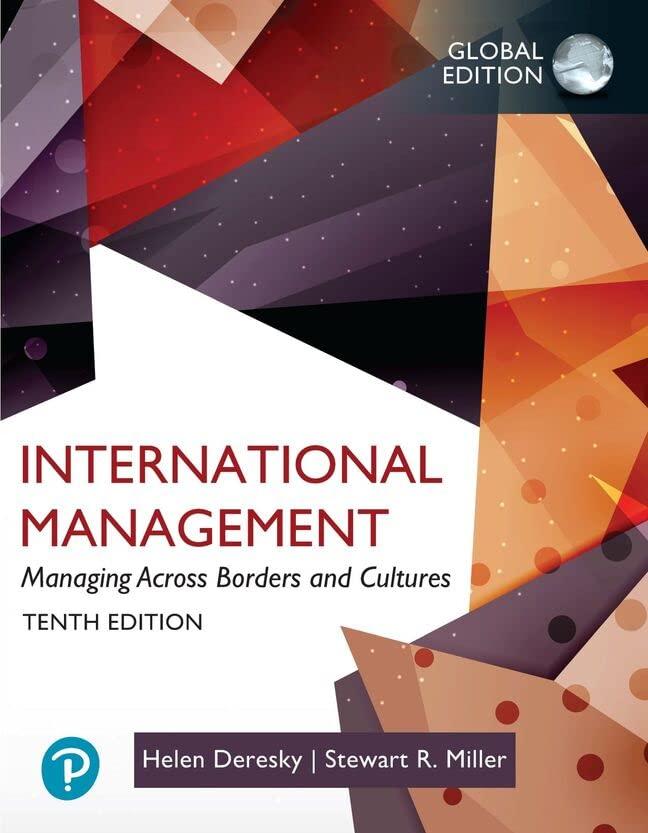Hundreds of UK businesses are setting up shop in the Netherlands in a new twist to the
Question:
Hundreds of UK businesses are setting up shop in the Netherlands in a new twist to the United Kingdom’s Brexit saga. When Andrew Moss sought advice from a senior government advisor about his business, Cambridgeshire-based Horizon Retail Marketing Solutions, he was taken aback by the response. Following the Brexit agreement that was signed in January 2020, he’d been finding it difficult to run the firm which sells packaging and point-of-sale marketing displays to UK and EU customers. What, he asked, was the solution to the mountain of red tape he now faced, as well as customs delays which had slowed business down to a crawl? Registering the company in the Netherlands was the suggestion from the advisor, who added this was not official government policy.
Moss subsequently followed this advice and set up Horizon Europe, laying off a small number of staff in his home market and taking on people in the Netherlands in the process. He is not alone in making such a move. By early 2021, as many as 500 businesses had reportedly opened operations in the Netherlands, or were in talks with the Dutch foreign investment agency, NFIA, about registering subsidiaries there. Indeed, Dutch logistics and warehousing companies are reported to be inundated with requests. While the trend is being actively encouraged by the Dutch government, what is most surprising is that advisors working for the UK’s Department for International Trade (DIT) are voicing this as the best way for UK small businesses to get around issues such as extra charges, paperwork, and taxes that have resulted from the United Kingdom’s decision to split from Europe.
By moving operations into this new EU base, UK firms can ship out large consignments to the Netherlands and then break them down and distribute them from there. This has the dual bonus of enabling these businesses to avoid a succession of lengthy cross-border delays on every small consignment they send as well as of defusing problems with VAT. In addition, this solves the problem of excess paperwork, which is a problem that has dogged many businesses trading in the post-Brexit world. According to the Chartered Institute of Procurement & Supply (CIPS), 63 percent of firms have experienced delays of at least 2–3 days in getting goods into the United Kingdom, with many saying those delays are getting worse, not better.
The Netherlands is an attractive option for UK firms seeking to gain a foothold in the European Union because a large percentage of the population speak English. In addition, it offers a very central location and is home to Rotterdam, the biggest port in Europe. This is also perhaps why a number of Asian and U.S. companies are reported to be eyeing this location as they rethink their European structure. The Netherlands has been the biggest beneficiary of business lost by the city of London following Brexit. In January 2021, Amsterdam overtook London as Europe’s largest share trading center, with more than €9 billion of shares being traded every day. While a large amount of business in stocks and shares has flowed away from the English capital to centers such as Paris, Dublin, Milan, and Frankfurt, Amsterdam has been the biggest winner. Stephane Boujnah, the CEO of pan-European stock market operator Euronext, which runs the Amsterdam stock market, claims this is because it’s seen as more international than other cities, with English as its second language and favorable tax conditions too. Amsterdam has also overtaken London to become the number one corporate listing venue in Europe and is out front in euro-denominated interest-rate swaps, a market estimated to be worth more than $135 trillion.
Brexit has not been all good news for the Netherlands. The United Kingdom is one of the country’s largest trading partners, with exports worth in excess of €15 billion. Traders report similar problems as the UK counterparts, when it comes to shipping goods across the channel to the UK, with extra costs, delays, and red tape. Figures from the United Kingdom’s Office for National Statistics show that trade with the European Union started to collapse since Brexit, although the pandemic had a marked impact too. Total trade, which includes imports and exports, fell by 23.2 percent in the first three months of 2021, when compared to the same period in 2018, before both the COVID-19 pandemic and Brexit. In the Netherlands, exports fell in value from £10.3 billion to £7.1 billion.
In addition, the focus on the Netherlands has not yet resulted in a noticeable boom in jobs.
Many of the UK companies moving to the Netherlands are opening with small or highly specialized teams. The Dutch Foreign Investment Agency does, however, anticipate about a thousand new jobs to be created by financial firms relocating to Amsterdam. Finally, owing to Brexit, the Netherlands needs to make a higher contribution to the EU budget, even if it remains unchanged.
With 27 member states, instead of the earlier 28, the remaining states will be responsible for making up the total sum.
Question
6-1. What has happened to companies like Horizon Retail Marketing Solutions? Has the move to the Netherlands solved their post-Brexit trading problems?
6-2. Could companies like Horizon Retail Marketing Solutions have anticipated these challenges before the Brexit agreement was signed? What should have been their main concerns and what preparations could they have made?
Step by Step Answer:

International Management Managing Across Borders And Cultures
ISBN: 9781292430362
10th Global Edition
Authors: Helen Deresky





